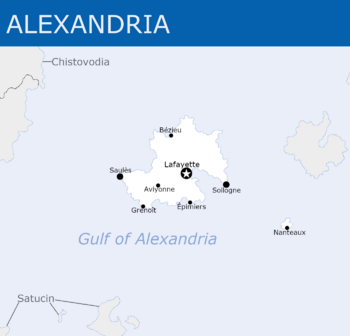Alexandria
This article is incomplete because it is pending further input from participants, or it is a work-in-progress by one author. Please comment on this article's talk page to share your input, comments and questions. Note: To contribute to this article, you may need to seek help from the author(s) of this page. |
Union of Alexandria Union d'Alexandrie (Gaullican) | |
|---|---|
Motto: Justice, stabilité, démocratie Justice, Stability, Democracy | |
Anthem: Hymne de la nation | |
 | |
| Capital and | Lafayette |
| Official languages | Gaullican |
| Ethnic groups (2017) | 51% Bahian 42% Euclean 5% Indigenous 3% Other |
| Demonym(s) | Alexandrian |
| Government | Federal Semi-Presidential Republic (De-jure) Federal Dominant-Party Republic (De-facto |
• President | Thérèse Besnard |
• Prime Minister | Achille Couturier |
| Legislature | National Forum |
| Independence from Gaullica | |
• Independence from Gaullica | 1935 |
• Aviyonne Declaration | 1962 |
• Current Constitution | 1980 |
| Area | |
• | 122,554.88 km2 (47,318.70 sq mi) |
| Population | |
• 2019 estimate | 832,000 |
• 2010 census | 793,000 |
| GDP (nominal) | estimate |
• Total | 11.9 billion |
• Per capita | $14,303 |
| Gini (2019) | 39.0 medium |
| HDI | 0.768 high |
| Driving side | right |
| Calling code | +48 |
| Internet TLD | .AX |
Union of Alexandria (Gaullican: Union d'Alexandrie), commonly referred to as Alexandria (Gaullican: Alexandrie) is a sovereign state located in Asteria Superior in the Gulf of Alexandria. The country shares sea borders with X and Satucin. The country is divided into X States with the cities of Lafayette and Soliogne being their own States. The island of Chotoise is Alexandria's only State not on the main island.
Archeological evidence suggests humans may have first settled or visited Alexandria around 1600 BC. The Island was later colonised by Gaullica and was part of the colony of Îles des Saints. The country remained a Gaullican Colony until it was granted independence in the immediate aftermath of the Great War. The Republic of Alexandria several months after independence began enforced segregation between the Euclean Majority and the native minority. Although the at the time President Lajoie spoke out against it, his position was powerless to stop the laws. This coincided with Alexandria’s Ascension to the Community of Nations.
The Economy of Alexandria began to steadily grow and was one of the fastest growing economies in the Eastern Hemisphere until the crash of 1975 when the Economy went into a deep recession for two decades and the nation was declared bankrupt. As a direct consequence of this the streets erupted into rioting and led to the collapse of the sitting Socialist government.
The Republic was ended in the 1980 Constitutional convention which also ended segregation nationwide, the new constitution paved the way for a Federal Union and equality between all people in Alexandria the Economy began to slowly recover in the mid-80s although Alexandria was still running a deficit for another decade as it struggled to pay off its debts.
In 1995 the National Coalition won a massive landslide election victory gaining 62/80 seats in the National forum. Shortly after a series of changes to Constitutional changes which were considered to be Undemocratic. All 62 constituencies where the National Coalition held seats had their borders changed and were evidently Gerrymandered ensuring their political dominance which continues to this day.
Today Alexandria is a member of several international organisations such as the Community of Nations, AFDC and the Organization of Asterian Nations. Alexandria is classed as an Authoritarian nation. The island is the fifth largest island in the Eastern Hemisphere although has a low population density.
Etymology
History
Prior to colonization
Early Gaullican rule
18th to 19th centuries
Early 20th century and the Great War
Post-independence
- Lajoie becomes President
- Segregation enforced
- Saint Baptiste declares independence
- Economic collapse
- Rise of the National Coalition
- Current

